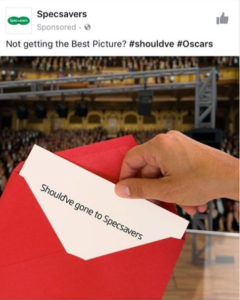Idents
Posted: Fri 21 July, 2017 Filed under: Advertising, Bad Ads, Brands, Domestic, Television, Thoughts Leave a comment »Of late, I’ve been watching a few more TV programmes on commercial channels, and as a result I’ve been seeing a lot more of the ident/sponsorship captions at the start and end of each ad break. (I’m sure there’s a proper name for them, but ‘ident’ will do for now) However, they primarily stick in the mind because they annoy me.
I know advertising is supposed to be all about brand recognition, making things that stick in the mind so we remember the company when we’re looking for whatever product they’re hawking. But all the idents (and a number of the primary adverts as well) only stick in my mind in order to be companies that I never, ever give any money to. (Which has happened several times now, looking for a product or service and knowing I won’t use [x] because their adverts annoy me so much)
Part of it, and the part that grates with me the most on idents, is a lack of range. I assume it’s a budgetary thing or something, but lots of them seem to make five idents, and think that’s enough. However, there are four ad-breaks, so there’s should be eight idents. Instead, we end up repeating at least a couple of idents – in just one programme! – and all that makes me think about the company is that they either haven’t thought things through, or they’re just cheap. Either way, I can’t see that as being the reaction/perception that the company is aiming for when they’ve spent a bundle on buying the slots and making the idents.
I mind less when they’ve only done the one ident – even thought it means it can end up being seen eight times per episode – because at least it’s simple and easy. It’s the supposedly-funny ones that aren’t amusing in the first place, let alone once you’ve seen it twice in an hour, and even less so over the full run of any series.
CrowdFunding
Posted: Wed 14 June, 2017 Filed under: 1BEM, Advertising, Cynicism, Domestic, London, News, People, Politics, Thoughts 1 Comment »OK, I’ve got a new doozy of a conspiracy/cynicism thing for you.
Remember a few years back, Cameron belted on about how cuts in services meant that “Big Society” should step up, and do the things that councils and governments could no longer afford to?
Well…
Since then, we’ve seen an explosion in crowdfunding stuff – goFundMe, JustGiving, etc., – and now, any time anything happens, one of those appeals gets started.
What if…. What if those crowdfunding sites are the Big Society plan – people paying what they can to help those less well off, or in trouble because of situations that’ve been initiated by councils and governments?
So like today, ‘raise £200,000 to help people at Grenfell‘ – a fire that’s at least been contributed to by the negligence and shitness of funding by councils and governments. And what’s the betting that those crowd-funded compensations take the place (to a degree) of councils having to take the strain and fund accommodation, clothing etc.?
It’s dark as fuck, but somehow it also makes sense…
#1 Dad
Posted: Wed 14 June, 2017 Filed under: 1BEM, Advertising, Creativity, Cynicism, Design, Domestic, Geeky, Marketing, People, Thoughts, Weirdness Leave a comment »Sometimes, you see something, and your brain just goes “What?!?” (or words to that effect, but with more swearing) Currently, there seems to be a theme connecting that with both Father’s Day and Star Wars.
Last year, we had the card with Kylo Ren…
[Spoiler from two years ago – Kylo Ren kills his father]
This year, I’ve seen this in Sainsbury’s…
I’m pretty damn sure they haven’t seen the same Star Wars films I have…
One Minute
Posted: Fri 26 May, 2017 Filed under: 1BEM, Advertising, Cynicism, Domestic, I Don't Understand, People, Thoughts, Weirdness Leave a comment »Yesterday, a lot of people held a one-minute silence for the victims of Monday’s bombing in Manchester. Personally, I don’t really understand why this appears to have become one of the “done things” to do for any tragic event.
Yes, the bombing is awful, and should never have happened. The people who did it are unutterable motherfuckers, and deserve to be damned to whatever eternity their religion believes in. The victims shouldn’t have been victims, because this shit shouldn’t have happened.
But it did, and so we go on.
But what do these silences actually do? They re-focus attention on the event (but of course we’re not going to give terrorists the air of publicity that they crave, except when we then have every news broadcast for the next 72 hours focused pretty-much-purely on that event) and make people think about it even more. But we’re not going to let terrorists change our lives, are we? Except when we do, when there are now more armed police on the streets, and even more security on the streets, in airports and elsewhere – all of which changes our lives, and makes us think about terrorism even more.
I know the silences started off from the two-minutes-silence on Armistice Day – and I’m fine with that. But when did they become the done thing, the marker for every event?
I feel the same about the huge numbers of bouquets at the sites of deaths and tragedies. I get that people want to voice their sympathies, but when did a bouquet and gifts become the way to do it? It’s almost enough to make you wonder whether it’s not the florist industry behind it all, in a similar way to Valentine’s Day, just to improve their own profits – but this time out of the grimness and death of others. And the sodding cards that go with it – the ones that get read out in news broadcasts, that all seem to be suspiciously “on-message” for whatever’s been being reported.
The real start for the floral stuff seemed (to me) to be the death of Princess Diana, when flowers appeared everywhere, in true Damien Day style. Since then, they’ve accompanied every bloody event known to man.
Fine, people want to show their concerns, voice their sympathies and so on. But surely it’s better to do so with donations to a particular cause, with speaking up about (in the case of Manchester) terrorism and the like, to actually do something, rather than pay lipservice through a wallet and a minute’s silence?
Oscar-sight
Posted: Mon 27 February, 2017 Filed under: Advertising, Films Leave a comment »One of the stories of the weekend was the cockup at the Oscars on Sunday night, with La La Land initally being declared as “Best Film”, when it was actually Moonlight.
Ooooops
(Supposedly, the auditors/organisers had “mistakenly given the wrong category envelope to the presenters”)
What I loved though, was the speed that companies like Specsavers got in on the act…
10,000
Posted: Thu 23 February, 2017 Filed under: 1BEM, Advertising, Cynicism, Domestic, Health, Laziness, People, Thoughts Leave a comment »Over the last couple of days, there’s been some coverage about an American scientist (which seems to be a pretty endangered species in the Age Of Trump) claiming that fitness trackers and pedometers are pretty arbitrary, and not necessarily the best way to go.
Which, I think it’s fair to say, we can file under “Sherlock, Shit, No”.
Of course that 10,000 steps a day advice is arbitrary. Even the figure tells you it’s arbitrary – those nice round numbers for ‘ideals’ simply don’t occur that often in reality.
Hager claimed the 10,000 steps target dated back to a 1960s Japanese study that showed there were health benefits for men who burned at least 2,000 calories per week through exercise – roughly equivalent to 10,000 steps each day. An early pedometer was known as the manpo-kei, which means “10,000-step meter” in Japanese.
Really, if anyone is taking anything from these devices as gospel truth, they’re a fucking moron. At best, these devices are indicators.
The heartrate monitor is well known to not be accurate – but so long as it’s fairly consistent per user/wearer, it’s a decent-enough indicator of where you stand. And if it suddenly dropped to reporting 10bpm (or 200bpm) then anyone vaguely sensible would take themselves to a GP for a proper check.
The same’s true for the sleep monitor (which I do use). It’s not gospel truth. But it’s a decent-enough indicator of awake vs. disturbed ‘sleep vs. actual REM sleep. Do I believe it innately? Hell no. But does it consistently show me my bad nights vs. less-bad ones? (I’m yet to have a good night’s sleep) Yes.
And if you can’t rely on those indicators, why would you rely on the step monitor? Simple, you wouldn’t. Can you game it and mess figures simply by swinging your arms more? Yep. But what’s the point of doing that, unless all you’re interested in is attaining that arbitrary [x],000 steps in a day? The only benefit in that is you, and you’re just cheating yourself.
However, it does make for a useful indicator, and a reminder to actually move more. I can understand (kinda) why people make these things into targets, but really all that’s important is being more active. And that’s what counts.
First Impressions
Posted: Sat 17 December, 2016 Filed under: Advertising, Bad Ads, Business, Catering, Cynicism, Literacy, Thoughts Leave a comment »It’s funny, sometimes, how a first impression – and sometimes even just a single word – can colour one’s judgement and feelings about something.
While geeking about yesterday, I did a google search for ‘Zucchini’ – a programme on TV was showing zucchini (courgettes) that were very different to the ones I recognise as courgettes, so I had a look.
And there on that results page, the second result was for Zucchini Restaurant in Batley, Yorkshire. It looks like this…
![]() Yep – the first word of text on the site contains a spelling mistake. On an Italian word. For an Italian restaurant.
Yep – the first word of text on the site contains a spelling mistake. On an Italian word. For an Italian restaurant.
And just like that, I know I don’t want to go. If that’s their attention to detail, I’m out. Simple as that.


